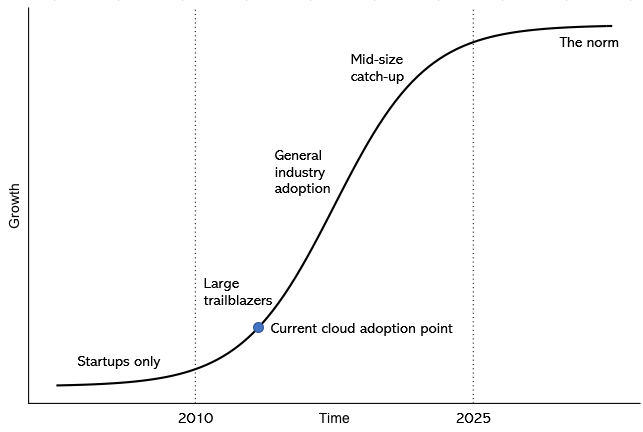Why it’s so hard to find roles in cloud technology, while jobs go unfilled.
In the last year I’ve met dozens of people who have taken many of the cloud certifications available yet been unable to land jobs in this space. Many have long resumes with impressive backgrounds, others have switched careers from science or math, while some are recent graduates trying to get into the newest area of IT. None of the people I met was obviously unqualified.
If you talk to recruiters or Human Resources, you’ll hear that AWS certifications are the hottest words on any technical resume . “There aren’t enough bodies to put in seats!” they say. Then if you turn around and talk to the crowds of the freshly-certified jobless — “Nobody’s responding to our job applications!” the chorus goes. You wonder, are these two groups living in the same universe? What’s going on?
Typically we have shortening 5-year cycles in tech that cause clamoring for new skills. First it was the internet (“HTML! Perl! PHP!”) then mobile apps (“Android! Objective C! React Native! Flutter!”) and now cloud (“AWS Certification! DevOps! SecOps!”). IoT and machine learning are probably next. The technology itself doesn’t really matter — companies just want an army of tactical workers to build this stuff tirelessly.
Back in the mobile apps craze, you could find a job with minimal experience — truly, it was the wild west. But in this cycle, companies aren’t throwing the offers at the newly-certified or ambitious. This is a very different space where the actual number of new cloud jobs created is going to be surprisingly small, a byproduct of the automation and commoditization of IT.
The tyranny of the S-curve
Each new technology has its S-curve and early adopters tend to overestimate how far we’ve progressed. In the cloud arena, adoption rates are nowhere near as high as many believe — in charting industry users against growth, I estimate it looks like this:

Right now in cloud, the real jobs are available at large companies who have either been early adopters or have new projects that were started in the cloud while the rest of their infrastructure is not. Anyone in their immediate orbit will see roles appearing in the cloud too — principally consulting firms and support vendors. These are where the best cloud jobs exist in 2019.
There are only a few mid-size companies in the cloud meaningfully at this point, though you will see many jobs posted. Some of these firms realize they need to renovate their IT but they attempt to do this through hiring “Digital Transformation” roles which do little but frustrate the revolving door of hires because they have no executive buy-in and budget. They also have entrenched IT that will not support these upstart attempts and the organizations need new personnel in IT leadership before anything significant can happen.
I realize there are many exceptions to these broad statements but generally I think the placement of cloud-adoption on the curve is fairly accurate, and we have yet to see a huge explosion in the demand for cloud talent. A little longer, when the mid-caps get into this space and the adoption curve matures, cloud skills will become mainstream requirements for IT staff.
But that’s not the whole story, and doesn’t account for why the newly trained and qualified aren’t getting into positions, and why corporate HR is claiming nobody is out there with the required skills. There’s another more important factor.
The collapse of IT headcount
When mobile apps appeared, the new skillsets had no impact on the existing IT environment. Sure, the UI/UX industry blossomed and there was movement around the development space, but you were unaffected if you worked in databases, security, server administration or the myriad other roles than keep the lights on at corporations.
With cloud, this is entirely different, and the language used in job descriptions is a clue to what’s happening. We’re seeing an aggregation of jobs hiding behind cool-sounding new buzzwords. Who doesn’t want to be a 10x coder or a Full-Stack Developer? Roles that have been separate for years — database admin, server admin, quality engineer, software developer — are being smashed together because the headcount is vanishing. These roles are asking you to do the work of several people but using your attraction to intellectual challenges to make it sound more appealing.
It’s noticeable right now because automation and cloud have hollowed out the core of once-venerable professions. Database admin is hard and almost redundant now with RDS; server admin is very hard, and mostly gone with virtualization. QA/QE has been gutted by TDD, CI/CD and automation which effectively stick the developer with the work. The jobs opening up include a requirement to know all these skills in addition to everything else.
In larger companies that are adopting cloud, generally they are taking the existing back-end staff and retraining them as cloud architects or scalability engineers. And this works well because the back-end people have a perfect skillset to learn about scalability, redundancy and availability techniques. It also avoids layoffs and they have employees already familiar with the systems and culture.
The NoOps movement gives the impression that all these server admins are going to be out on the street fairly soon. But the reality is that the cloud will be very good for these groups, and their roles are becoming more generalized and coming towards the front-end. It’s fundamentally much easier to take an experienced back-end engineer and bring her to the front-end than vice versa. And this will be extremely obvious as serverless gains traction, since serverless is basically programming for infrastructure engineers.
The key thing here is that businesses are not hiring fresh-out-of-certification AWS experts to take over the infrastructure of their established operations teams. They want people with solid experience, a risk-free bet that the new hire can execute the tech flawlessly. This often means insane job requirements (I’ve seen “10 years’ serverless” as a hard must-have recently) and an existing track-record of success.
These companies have no interest in paying people who have learned, studied or recently certified unless it’s the icing on the cake of many years’ real-world success. This is probably no surprise in retrospect but it does mean you have to question the value of telling hopefuls that enormous opportunity exists unless they have this existing infrastructure experience.
Where are the opportunities for a cloud career?
For people without this background, the best AWS jobs available right now are in sales, account management and roles that aren’t directly technical. This is especially true in the vendor ecosystem, where they are less interested in a previous life in the backend.
If you are looking for business transformation, your best options are startups or consulting firms. Both come with their own set of problems but are the only places where you will be allowed to be a revolutionary. These roles don’t exist in larger, established companies, except to a privileged few who have already served their time working through the middle management hierarchy.
If you are a coding superstar, the sort of developer who soaks up new languages and frameworks for breakfast and has the capacity to put cloud skills under your belt, you’re already working for a FAANG or soon will be. The very small number of engineers who don’t use Stack Overflow twenty times a day and can remember the differences between a stack and a heap, they are being sniffed out by the big tech firms in an unstoppable hiring frenzy. This will be an extinct breed in regular companies very soon.
Finally, there’s going solo — the nuclear option. One respected tech thought leader recently Tweeted that there’s a “Huge arbitrage opportunity for Cloud DevOps people to go and make these deals to companies needing to make cuts in expense.” On the surface, this seems right — cloud professionals are the magicians in technology right now, and can seemingly take advantage of automation to slash expenses, leading to riches.
But this is the consulting trap, and it’s alluring to people who are smart, qualified and want to get out of their full-time employment rut to drive change independently. It doesn’t work usually thanks to the difficulty of finding willing customers, and I can tell you this from personal experience and the sea of talented tech people who have tried and failed at the same thing.
For most in IT, the paradox of the cloud is going to heavily influence our roles going forward. You will have to keep learning new skills at a much faster rate than peers in other industries, but you’re running up a down escalator that’s speeding up. The rate at which cloud is gobbling up the entire ecosystem creates opportunities for the experienced but ultimately will make it much harder for those switching careers or entering at a junior level.
Author –

Except for the featured image, this story has not been edited by Javelynn and is published from a syndicated feed. Originally published on https://itnext.io/the-cloud-skills-shortage-and-the-unemployed-army-of-the-certified-bd405784cef1.



